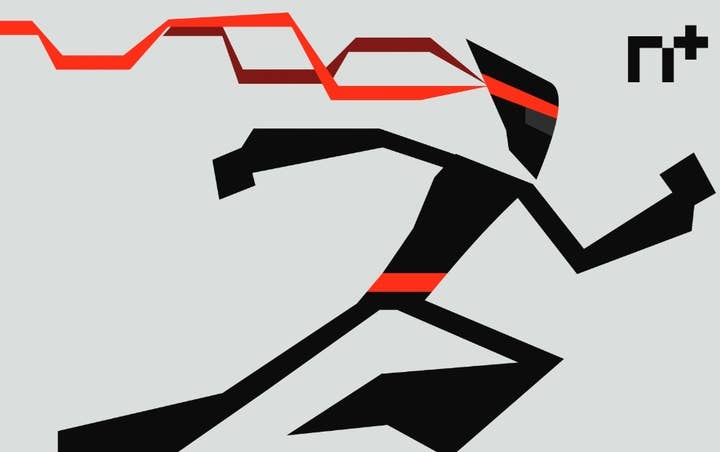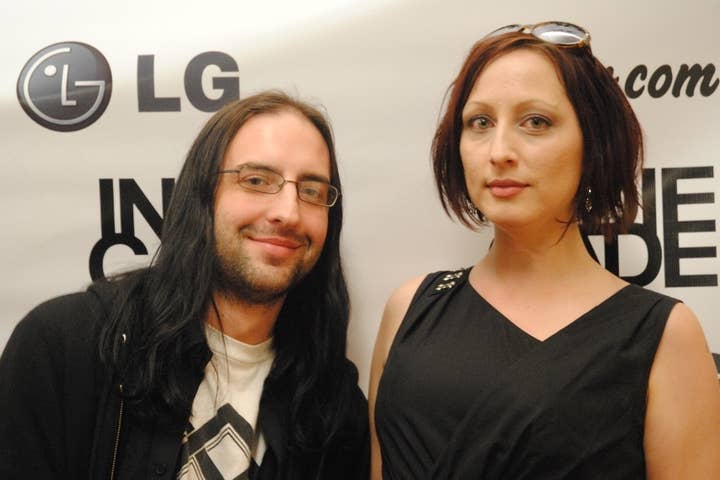Metanet's minimalist approach goes beyond art
N++ developer on how they've lived off an Xbox Live hit for nearly six years, how they wound up on PS4, and why Steam is a bit depressing
There aren't many developers who can survive for almost six years between releases. One way to do it is to make a blockbuster success: a Skyrim, a Grand Theft Auto, a Minecraft. Then there's the way Metanet Software has done it. The Toronto-based studio had a successful Xbox Live Arcade launch in February of 2008 with N+, and later this year (or early next) plans to debut N++ on the PlayStation 4. Speaking with GamesIndustry International last month, Metanet's Mare Sheppard and Raigan Burns explained how they've kept the lights on for so long without a new release.
"We're very conservative from a business point of view, maybe too conservative," Burns said. "But we feel the problem a lot of game studios have is that if their next game isn't a hit, they go bankrupt. And that's a really bad position to be in for a lot of reasons. Certainly creatively, you don't want to have to make sure something connects with everyone."
"If you burn as little money as possible, then you can last for so much longer."
Raigan Burns
So their conservative approach to business is designed to allow them the latitude to be as daring and experimental as they want in the games they make. But what do they consider conservative? First, overhead is kept as low as possible. Sheppard said N+ has sold between 450,000 and 500,000 copies on Xbox 360. It still brings in some money, selling about 30 or 40 copies on a daily basis. Despite the cash injection of having an indie hit, Sheppard and Burns embraced an approach Burns described as "the tenacity of the cockroach."
"If you burn as little money as possible, then you can last for so much longer," Burns said.
Metanet doesn't play around when it comes to keeping costs down. Burns said the duo "finally caved" about a year and a half ago and paid for an office instead of working from home. While it's increased their productivity, it's also doubled their burn rate.
They've also kept headcount down. Sheppard and Burns do as much of the work as they can, and enlist friends and contractors to collaborate in areas where they don't have the expertise. For example, on N++, the pair have Dyad creator Shawn McGrath helping them out with programming, and they hired graphic artist MASA to refine the game's minimalist art style. The approach has worked for them so far, but it's one they have second thoughts about from time to time.
"We're constantly questioning that, especially because in Toronto, Capy has grown a lot, and Queasy grew a lot during Sound Shapes," Burns said. "So we've seen that there's just so much more that you can do when you have a lot of resources. It changes the stuff you can do. But we're pretty comfortable. We essentially work for room and board, and you can pay yourself very little when you're paying yourself and that's not really an exploitative relationship. But if we were going to hire someone, we'd want to pay them good money, and we would really make our burn rate go through the roof."
Sheppard added, "N+ sales are good, but they wouldn't support that kind of situation for very long. So when we do big projects like [N++], we try to get funding, some outside money so we can make it happen. Ordinarily, I don't think we could ever afford a project as big as this."
The "big" project that is N++--with a headcount of Sheppard, Burns, McGrath and MASA--was made possible by Sony's Pub Fund initiative, which gives developers an advance against royalties paid upon completion. Sheppard and Burns said they brought N++ to Sony largely because Sony had been actively pursuing them, and when they saw the PlayStation Vita's OLED screen, they figured the game's minimalist aesthetic would fit the tech well. Then when the PS4 came together, Sony asked if they would be interested in making the game for the new console. They didn't have the resources to do both, but thought it would be a feather in the cap to have a game out for a console launch, so they made the switch. (N++ wound up missing launch, unfortunately, so that feather will remain uncapped for now.)
"If Microsoft had come to us for N++ on Xbox One, we absolutely would consider it. But the fact is they just didn't. There's not that connection."
Mare Sheppard
Oddly enough, N+ wound up on the Xbox 360 in much the same way. Sheppard and Burns had made the original N as a freeware game for PCs, and they brought it to Xbox 360 because someone at Microsoft had been a huge fan of the game and suggested they bring it to the console.
"I really don't want to downplay the psychological impact of feeling wanted," Burns said, "and feeling like the people that you're working with get where you're coming from and like your game."
Sheppard added, "If Microsoft had come to us for N++ on Xbox One, we absolutely would consider it. But the fact is they just didn't. There's not that connection."
"I suppose the image that's revealing itself here is that we just sort of sit around and then someone pokes us externally. 'Hey, you want to do this?' Oh yeah, sure," Burns said. "It's kind of weird and hard to quantify, but it's really strongly motivated to feel encouraged by someone."

One of the drawbacks to waiting six years between releases is that the industry has undergone some drastic changes. The indie scene in particular has seen an explosion of interest, both from consumers and developers. When asked if this explosion of interest is sustainable, if there's enough of a market to actually provide for the rush of new creators, Sheppard and Burns were skeptical.
"I think there's definitely not enough of a market to sustain all these people, but that's been the case forever," Sheppard said.
Burns said he'd thought there had been an indie "gold rush" as far back as 2007, but just because he thinks breakout success stories like World of Goo are going to be harder to come by, that doesn't mean the market's toxic.
"Maybe this is a bit optimistic, but it seems conceivable that it will be sustaining in that people will be making really personal, special kind of games that connect to an audience of thousands or tens of thousands," Burns said. "Maybe I'm biased because I want it to be sustainable, but I'm pretty hopeful there's an audience still. It's just like a bunch of overlapping niches; it's not like Call of Duty where all these AAA games are chasing this one set of players. There are people who might really like Super Meat Boy and might really not like Dear Esther, and vice-versa. And that's pretty cool."
"[W]e need an audience who is motivated enough to find stuff. But it seems like people just want to sit there and have stuff shoved in their face."
Raigan Burns
Sheppard and Burns also take issue with one of the factors that has contributed to the success of many indies, Valve's Steam storefront.
"I personally have been a bit depressed about Steam because it seems like what you really want is everyone selling their stuff themselves through their own website," Burns said. "But for that to be feasible, we need an audience who is motivated enough to find stuff. But it seems like people just want to sit there and have stuff shoved in their face. And that's sort of the function these curated things have."
Burns would prefer to have an audience passionate about something connect with a developer who shares that passion, rather than "hordes of consumers who buy a whole bunch of stuff because it's $0.99 and don't even play half of it," which seems to be the dominant model on Steam.
"You need the expectation that you can get any game from anyone, but you also need an audience who's willing to go out there and look for games they want to play and get them," Sheppard added. "I'm happy that there are so many avenues to sell your game other than Steam, but at the same time, it doesn't really help when everyone basically uses Steam. It shouldn't be a monopoly, and it isn't, but it sort of is."
Photo courtesy Flickr user jeriaska.









